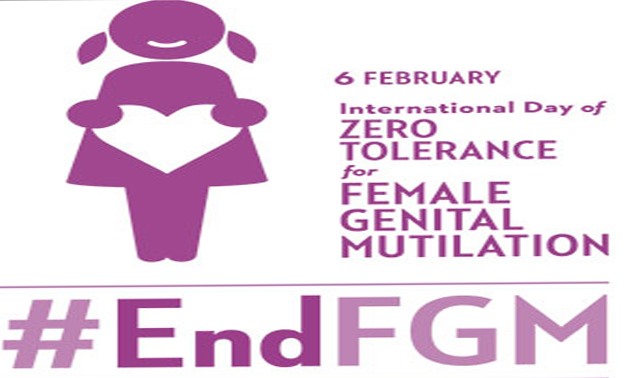
End FGM Logo - Photo Courtesy of United Nations website
CAIRO – 14 June 2019: Egypt is a pioneering leader in eliminating Female Genital Mutilation (FGM) phenomenon, the UNFPA-UNICEF Joint Program on the FGM said in a statement on Thursday.
“As part of the global response, success is determined by political will, accountability (at national and sub-national levels) and creation of an enabling environment that engages and coordinates actions from stakeholders across all sectors and partners,” the statement read.
Egypt’s efforts comes in light of the SDG 5.3 and the African Union’s Transformative Agenda 2063, the statement added, commending Egypt’s’ leadership regionally and internationally amid its leadership of the African Union.
The National Committee of the Eradication of FGM has launched an awareness campaign against female circumcision, on the occasion of the National Anti-FGM Day which falls on June 14.
“We consider ourselves today more fortunate in facing all forms of violence and discrimination against the female child and the woman, thanks to the continuous support of the political leadership and President Abdel Fatah al-Sisi to the protection and empowerment of the Egyptian female child and woman women, and the government's commitment to enforce national legislations and international commitments, in accordance with Egypt's strategic vision," said Maya Morsy, head of the National Council for Women on Thursday.
Anti-FGM efforts
FGM is carried out by some people especially in some countries in Africa, Asia and the Middle East, through cutting or removing some or all of the external female genitalia.
In statements on Wednesday, Ashmawi said the campaign is entitled "Budour Month" after the name of a 11-year-old girl who died of complications of a circumcision surgery in a private clinic in the Egyptian village of Mughagha, Minya governorate, in 2007.
She asserted that NCCM has been working over the past few years on several programs to counter such practices through the various mass media means.
Ashmawi also said that in 2016, the government toughened the punishment against those involved in such practice and established the anti-FGM national committee under the chairmanship of the NCCM.
Egypt imposed a complete ban on female genital cutting — also known as female genital mutilation or circumcision — in June 2007 after Budour Shaker died of an excessive dose of anesthesia while being cut at the private clinic in Upper Egypt.
Egypt’s Grand Mufti, the government’s official arbiter of Islamic law, decreed during the same year that female genital cutting was forbidden by Islam, in his strongest statement yet against the practice.
FGM was criminalized by Egyptian parliament in June 2008, thus creating a paradigm shift by moving the practice from social norm to crime.
Additional reporting by Amr Mohamed Kandil

Comments
Leave a Comment